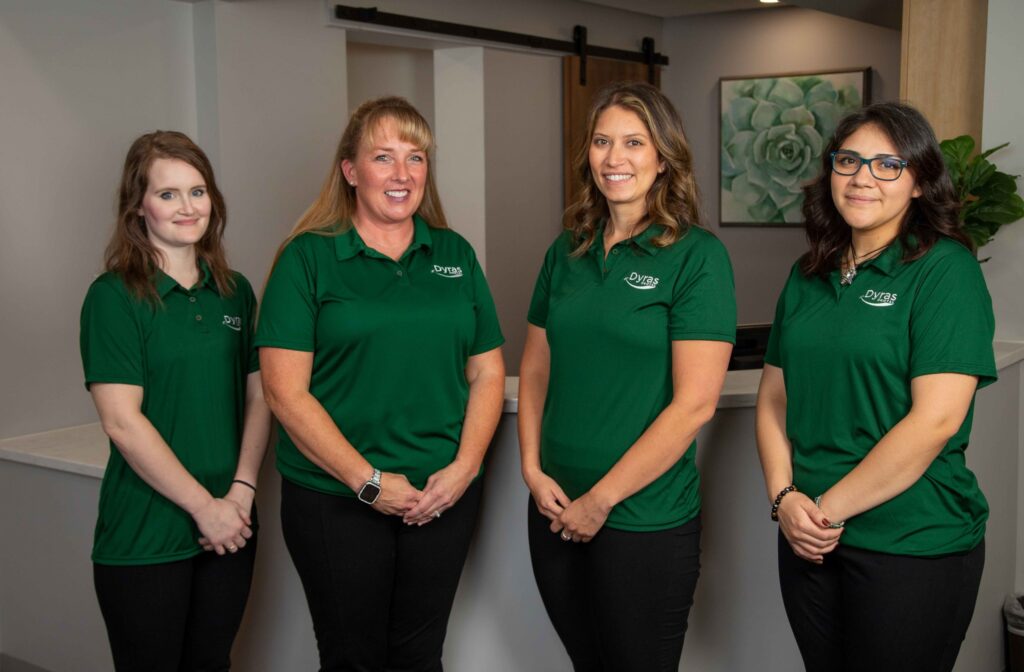Dentistry Frequently Asked Questions
May 21st, 2025
What is Dentistry?
Dentistry is the part of the medical health field that addresses oral health. The mouth can be a great indicator of how healthy your body is. We can detect signs of general health issues including diabetes, high blood pressure, inflammatory diseases, cancer, and sleep apnea. We assess and help improve the health of your gums, which are proven to be linked to general health issues. We can help detect issues with your teeth early to prevent the need for extensive treatment. We replace teeth, fix teeth, and help keep them healthy.
What should patients look for when choosing a dentist?
Patients should look for a dentist who is willing to listen to them and involve them in choosing the best care options. There are lots of different ways to address oral health needs and it is important to have a guide to help find the best care for you. Our office utilizes photography to educate patients about their oral health needs and reviews pros and cons of each treatment option to help choose what works best for each individual patient.
Why is visiting the Dentist so important?
Dentistry is focused on preventative care. In the medical field, many times patients are not treated until they already have a problem. Because we have the advantage of regular exams and radiographs, we can catch cavities and break down early and prevent them from spreading deeper or to other teeth.
How can patients maintain oral health between visits to your office?
Brushing their teeth twice a day for two minutes, and using either floss or a Waterpik to clean between the teeth at least once a day. This regimen will help maintain a healthy mouth and make hygiene visits more comfortable and enjoyable.
Why do patients need to see the dentist if they have braces?
Having braces on your teeth makes it much harder to properly clean and can make you more prone to gum inflammation. Having regular cleanings and check ups can keep your gums healthy and help prevent decay from forming around the brackets.
What is involved in the first visit?
During your first visit at Dyras Dental, we will give you a tour of the office and interview you to determine what your concerns are with your teeth and oral health. We then take a series of photographs and radiographs that help evaluate the state of your mouth. Dr Dyras will do a thorough exam of your jaw joint, chewing muscles, gums, tissues in your mouth and your teeth. Any findings that we have are reviewed with you using the photos that were taken so you can see what we are discussing. We listen to your concerns and feelings about what is being presented so that we can come up with a treatment plan that will achieve your goals.
What services do you provide and why should patients choose you for these services?
We provide a wide range of services, including care for jaw joint pain, bleaching, tooth bonding and white fillings, implants, dentures, veneers, root canals, bridges, crowns, treatment for gum disease. Patients should choose our office because of our focus on quality care, patient service, and excellent communication. We go above and beyond to make sure that you get the treatment that you need in a comfortable environment.
What accreditations/certifications/awards/specializations for various types of dentistry have you received?
I have a Doctorate of Dental Surgery from Detroit Mercy School of Dentistry. I have been a Fellow in the Academy of General Dentistry since 2020. I lead a study club for local area dentists and have taken extensive post doctorate classes through the Dawson Academy, Spear Education, and the American Academy of Dental Sleep Medicine. I am a member of the Spear Faculty club, as well as the Michigan Dental Association and the American Dental Association.
Why did you choose to become a dentist?
I chose to become a dentist because I loved working with my hands and wanted a career that melded art, health care and science. So much of dentistry is artistic, as every case is unique and no one solution will work for every patient. I enjoy general dentistry because I can get to know my patients and provide them with excellent comprehensive care that I can be proud of.



